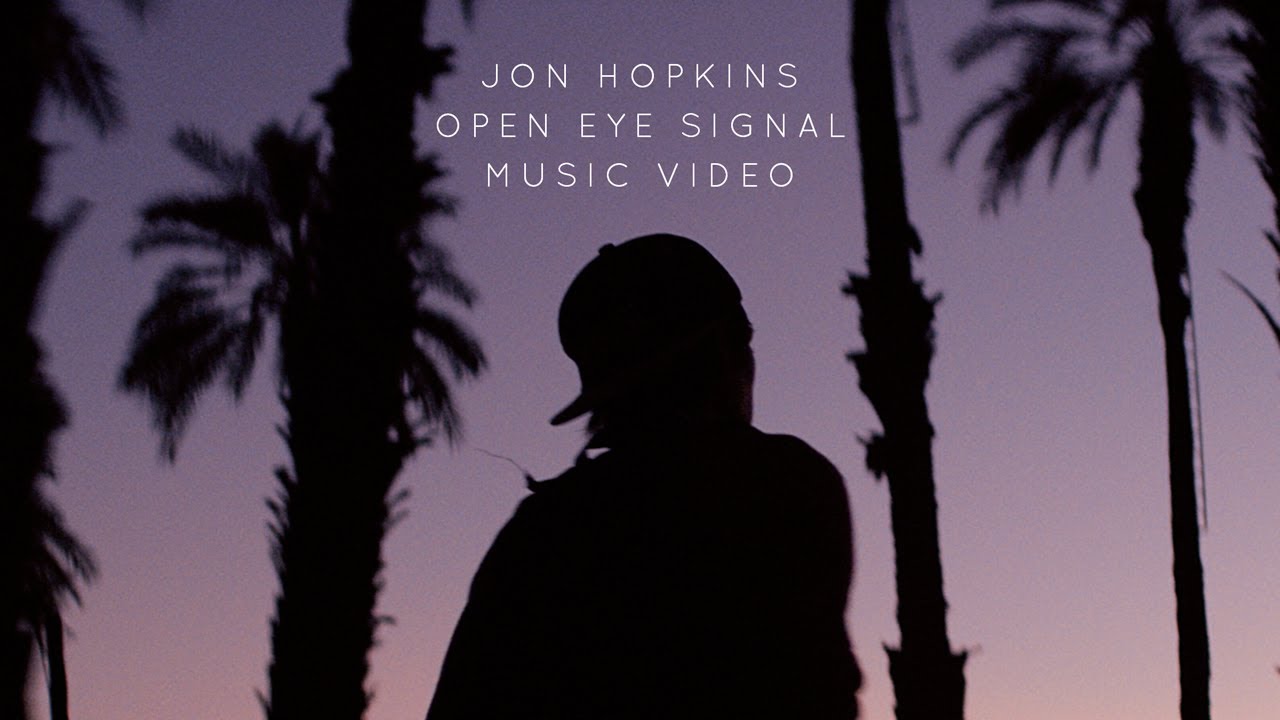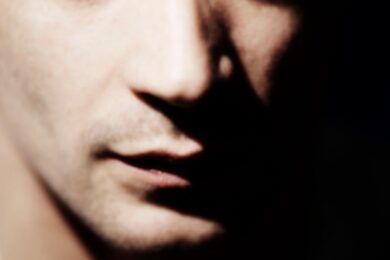You approach Jon Hopkins’ studio down a nondescript street in Bow, East London. Once a pub, the boarded-up windows and sturdy door make it look more like a squat than a place where music is made. Once inside, though, it’s a far more intimate affair. There’s a rickety kitchen with uncountable varieties of tea, and ephemera covers the walls of the living room – an army surplus wooden storage cabinet that featured on the cover of Hopkins & King Creosote’s Honest Words EP, and plastic, remote-controlled candles flicker. In a cupboard are unopened cans of beer from the 80s – detachable ring-pull! It’s this space, and Hopkins’ tidy room within it, the piano that he’s had since he was child sat in the corner, that shapes the warm techno and ambient sketches that make up his new album Immunity.
As Joe Clay’s review of the album points out, this is the record that defines Hopkins, an artist perhaps better known for his collaborations – be they with Creosote, Brian Eno, or contributing to Coldplay albums. Although his previous solo albums became the keys that unlocked many of the doors – working with Eno, financial security via a sync with Sex & The City – Hopkins says that, in retrospect, he’s pleased that his earlier work was somewhat ignored. “It was humbling. It’s good to be cut down to size and to just have to fucking work."
You can sense the effort that went into Immunity, throughout its eight tracks that veer from the doomy 4/4 of ‘Collider’, to the burbling, watery euphoria of ‘Open Eye Signal’ to ‘Sun Harmonics’, which rattles along like an ancient wooden clockwork train. This presence of the actual is made clear from the off, when the sounds of Bow streets and the rattling of keys in a lock give way to rhythm in opening track ‘We Disappear’. It’s refreshing to hear an electronic album by an artist of Hopkins’ ilk that has such a sense of space, mind and humanity, rather than merely a sense of the cold, plastic confines of a laptop and headphones. The Quietus went to Bow to speak to Hopkins about the development of Immunity.
Thinking about the intro track, was it important that those sounds were the actual building where the LP was being made?
Jon Hopkins: I wanted to make a monochrome intro to a bright, colourful record. It starts with reality and then goes on a journey somewhere else. It’s supposed to be inviting and intriguing, but not necessarily deeply satisfying. For the people who work here, and I am one of four, that door shutting is the most familiar sound in the world. You hear it ten times a day, and the sound of the window vibrating when I have a kick drum going, I felt it important to include that. It was the idea of incorporating the reality of making the music.
In the corner of your studio there you’ve got your old piano and of course you were classically-trained. How did that come into Immunity?
JH: I’ve had that piano since I was eight-years-old. I used the pedals for rhythms, though the sounds have been through so many processes nobody will ever be able to tell. Most people get an 808 patch, do a double speed rhythm and that’s that. It seems amazing that everyone uses the same drum sound, I hear it all the time. I don’t understand the idea of starting from the same point and not changing it that much. Using real instruments, real things (even real synths because they’re physical things too) each time you include a new instrument it adds new depth. Equally each time you record a track entirely on a laptop it takes away depth, so you end up with this piece of CGI music.
What else did you use?
JH: There’s a box of incredibly cheap percussion that the studio has, tambourines, shakers, kids toys, salt or pepper shakers, other granular condiments.
Was there a feeling that you’d put too much trust in technology in the past?
JH: The only reason I moved up from a knackered old PC was that when I started doing film scores it crashed when I tried to run video and audio. I had to get a Mac and learn Logic, which was actually a blessing as it meant I can incorporate all these other things. When you just use knackered old stuff it causes you back pain, headaches and sleepless nights, and there’s this purist instinct that makes you think you should never be interested in technology, but you need a balance of new and old. I do dislike a lot of things about the digital world, which is a paradox as so much of what I do is made on computers. But I hate how so much wonder has been taken out by having instant access. On this phone you have the entire history of human knowledge, but it’s not even exciting. So when I was making this album it was very much using a mixture of the old and new.
It’s not like I put less into films or Diamond Mine, it’s just that music is a lot easier to make. I can sit there doing stuff to Kenny’s [King Creosote] vocals and strings and little bits of warm washes of sounds, that comes very naturally. But when I do a solo album that’s when I have to force it on a level, and move myself out of those parameters. On this album it was to conquer those things of learning how to make riffs properly, and use synths properly for the first time. Less laptop, more reality, and making grooves – I don’t even have think about that on those other projects. The way I can do it is to drum on something, as free as possible, and then get it on the screen. It’s about getting the humanity into it, breathing real stuff into it. Having one thing gridded and everything else is completely loose. That’s what makes it dance music, and not some sort of weird ambient hybrid, which is what it was before.
Was there an intention to not be too ridgid?
JH: I had a chord of two notes going, and a truck will go past outside, and put its reverse alarm on and that hits a note that I wasn’t going to do, and I hear that note and think ‘fuck, the sine wave coming on and off at this point would be rhythmically perfect’. It’s about being open to accidents and serendipity.
What inspirations were there?
JH: I get obsessed with one thing that happens and try to recreate it sonically. I was in a hotel bathroom, and this noise was coming from the pipes. It was ridiculously beautiful, and so hard to describe, these little notes were dotting around me, five notes that made up a perfect chord. I could not work out how it was happening, it was obviously some incredible accident of sound and air moving. I’ll never forget that sound, and I’ve tried to recreate it so many times. The same thing will happen with something I see. My mum’s house is near the Thames, and the sun would reflect the water in a certain position at a certain time in a certain month of the year, and I filmed that and tried to time notes to hit at the same time. It’s how in nature things are random but also patterns.
How did the structure of the record work?
JH: It’s a story. In the past I’ve had that narrative of a night that’s so much fun that it becomes too much, and when you’re drifting off at 9am it’s not just ‘oh I’m fucked’, it’s quite a deep and emotional, warm place to be in because of the nature of MDMA. With this one, though, I’m thinking quite apocalyptically, which isn’t hard these days if you read anything about the environment. It’s hard to carry on, it’s not looking great. A lot of the record is about the sadness of that, the amount of species becoming extinct and rainforest we’re losing every day. We live in a bubble away from that, we can’t see it immediately. I don’t go about my life thinking about this, but when you sit in a really hot room like this and its incredibly intense and you write something, you find this stuff comes out and you find you’ve written a far more serious thing than perhaps you intended to.
Did that happen with this record?
Definitely. When I wrote the first track, all euphoric techno and it has that happiness to it, but then it became more serious. I accept it now, that’s what it is. I want to make something with guts and purpose, that isn’t pussyfooting around wet-arse rubbish grooves. I love the coldness of British music, but by the end there’s loads of escapism. You need both those things. I want to provide that contrast, because one informs the other. By the time you hit the lovely stuff you’re so ready for it, you’ve been shown things you didn’t want to see, or you’ve had the most intense rave.
What’s the significance of your interest in hypnosis?
JH: The hypnotic thing is a 12-year obsession I’ve had since I started meditating. I don’t do it any more, but I learned self-hypnosis and how to go into a trance. It’s fascinating, trying to train the brain into slowing down, stopping and just being, seeing what happens. When I had the first glimpse of doing it successfully, it started informing the music. But I didn’t have the technical ability to do it until I got to this album, and this age. There is one track on Insides, ‘Drifting Up’, that does it, this looping thing. This all puts down very subjective feelings about how my brain has felt on specific occasions, whether through meditation and hypnosis or taking stupid drugs, or stupid amount of brilliant drugs. The common patterns that inform it are something repeating with something gradually changing over time. It’s minimalism in music, it’s not a new idea, but I was discovering these things for myself.
Do you find yourself being hypnotised in the studio?
JH: It became my test as to whether a track was good enough. I made a riff, and I’d come in the next morning – the first listen is the crucial one, that’s how you know if it’s right. if the first listen sends me off and by the end of it I feel high and transcendently happy, it means it works. And if it doesn’t, it’s immediately obvious. As I approached mastering day the only way I could tell if the album was working was to get this big mattress out, put it on the floor and play the record, and if it sent me off it worked and was done, and it did. It sent me off into a transient state of some sort, of being no longer in the room, being up here, somewhere…
Immunity is out now on Domino. Jon Hopkins plays the xx’ Night & Day festival at Knebworth Park on Saturday June 22, tickets and info here




